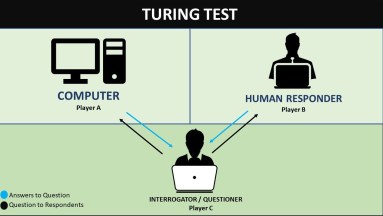With the frantic rush for Artificial intelligence and tools for productivity, there is a clear direction of how jobs and careers and life would be impacted. Already, large enterprises are cutting back on open positions and collapsing roles. The most prominent is IBM whose CEO, Arvind Krishna has announced that 30 percent of non-customer-facing roles could be axed in the next five years and IBM has actually frozen 7,800 positions that were supposed to be filled during this timeframe.
If that is not scary enough, the ability for AI to pass the Turing test means that even customer-facing roles would be impacted!
What is the Turing test you might be tempted to ask? We will save you the Googling time.
Turing test is a test for computer intelligence where the pass mark is for the computer to be able to perform communications with humans in such a way that the human recipient cannot distinguish between a real person and the computer. This was developed by Dr. Alan Turing in 1950 and computers have not been able to pass or fool people till 2021! Read more about the “Imitation game”
 So, you can be chatting with a machine and think that a real customer support agent is chatting with you. With this possibility, most of the customer support roles run the risk of being cut. So you want to talk to the airline agent about your flight from Port Harcourt to Abuja, you are chatting with a MACHINE, but you do not know. For your Netflix or Bank account issue or DSTV, you may already be chatting with a computer. The computer would not be sick, would not require leave days or a pension, etc. Would not be emotional or shout at difficult customers.
So, you can be chatting with a machine and think that a real customer support agent is chatting with you. With this possibility, most of the customer support roles run the risk of being cut. So you want to talk to the airline agent about your flight from Port Harcourt to Abuja, you are chatting with a MACHINE, but you do not know. For your Netflix or Bank account issue or DSTV, you may already be chatting with a computer. The computer would not be sick, would not require leave days or a pension, etc. Would not be emotional or shout at difficult customers.
What does all these mean? Computers can now outthink humans in complex reasoning at the same time, can win in emotional/divergent thinking! Scary? YES. Everyone in the tech world is scared now.
Jobs like engineering design, business intelligence, system monitoring, finance and supply chain/logistic are the first to go. You will need the AI to plan and calculate the Quantity survey real soon and it would do it to the nearest precision more accurately than the expensive Quantity Engineer with 23 years’ experience. Everyone is going to need to relearn and those who have not yet started learning skills are going to have to learn applicable skills for the future.
As we have seen, Nigeria is one of the fastest countries in Africa to adapt to new technologies meaning the children of now would be doing job roles that do not even exist today. We have seen the influx of AI show better results in predictive analysis in the stock market, show high capabilities than experienced doctors in medical diagnosis and deliver better outputs in programming.
The human might not get totally replaced, but the number required in these previously “blue” careers are not going to be more than a fraction of the numbers required today. Look no further than the Nigerian banking industry for a real-life example. The number of banking officers required to run a bank after the digital storm compared to 20 years ago as well as the number of customers they serve.
So… please, do not say, “Ngozi would be a doctor like me!” as these careers too seemed to be threatened by the possibilities emerging. Law, finance, personnel management et al.
As self-driving cars improve and the adoption of Auto-Pilot in the Boeing aircraft, there is a further narrowing of options even in previously unassailable careers. Hotels today have started adopting self-checking and baggage handling, self-cleaning robots getting popular in holiday resorts as guests do not feel the staring eyes of the maids and do not feel guilty not giving the robots a tip.
The most important thing for parents and wards in Nigeria now is to keep the next generation in the periscope of Technology as the versatility of the future workers could be the key to this impasse in the ‘dark-hole’ we are about to enter. We cannot ignore this “Elephant in the room”

A business concern is not going to employ a Design Architect when they can buy a software for $300 that does the same for EVER. Worse, most of the AI tools come as licenses of $15 a month meaning there is no need for huge pre-use investment, but only a need to use bases

